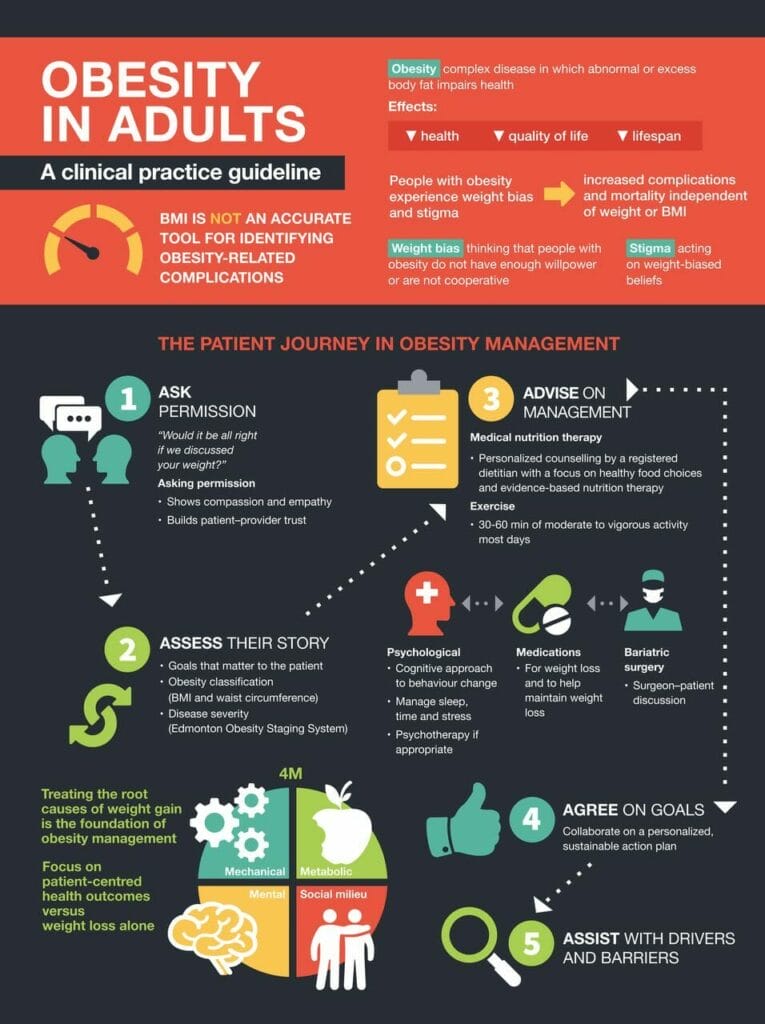We congratulate our colleagues in Obesity Canada on the publication of the Canada Adult Obesity Clinical Practice Guidelines. They have been developed by the Obesity Canada and the Canadian Association of Bariatric Physicians and Surgeons. So, What are the key findings and what does this mean?
We know Obesity is globally defined as having a body mass index, (BMI) of 30 or more, the 62 authors of the Clinical practice guidelines offer a new definition.
Dr Arya Sharma tells The Globe and Mail
“It’s not about the amount of body fat, it’s not about where the body fat is. It’s not about the type of body fat, It’s just a very, very simple question. And that is: Does this person’s body fat or excess body fat affect their health? If it does, we’ve got obesity. If it doesn’t, we just have a large person with a lot of body fat.” ,” said Arya Sharma, scientific director of Obesity Canada in an interview.
He continued on to say “It’s not as simple as to say that people are getting fat because they’re eating junk food. No, it’s a lot more complex than that,” he said, explaining people’s bodies resist losing weight and regain it as soon as they quit adhering to any kind of diet or weight-loss strategy. “That’s what makes this a chronic condition. … You’re always going to be fighting this pretty much for the rest of your life.”
Read the full article here.
Among the key recommendations for physicians include asking permission to discuss a patient’s weight, understanding the root causes of their obesity, discussing treatment options, collaborating with the patient on long-term goals, and helping patients with barriers to accessing proper treatment.
“Obesity continues to be treated as a self-inflicted condition, which affects the type of interventions and approaches that are implemented by governments or covered by health benefit plans,” the report states.
The guidelines note that there are instead several root factors for someone’s excessive weight, including genetics, sociocultural practises, adverse childhood experiences and mental health conditions, among others.
Key Points
- Obesity is a prevalent, complex, progressive and relapsing chronic disease, characterized by abnormal or excessive body fat (adiposity), that impairs health.
- People living with obesity face substantial bias and stigma, which contribute to increased morbidity and mortality independent of weight or body mass index.
- This guideline update reflects substantial advances in the epidemiology, determinants, pathophysiology, assessment, prevention and treatment of obesity, and shifts the focus of obesity management toward improving patient-centred health outcomes, rather than weight loss alone.
- Obesity care should be based on evidence-based principles of chronic disease management, must validate patients’ lived experiences, move beyond simplistic approaches of “eat less, move more,” and address the root drivers of obesity.
- People living with obesity should have access to evidence-informed interventions, including medical nutrition therapy, physical activity, psychological interventions, pharmacotherapy and surgery.

View the full CMAJ publication here.
Details of Obesity Canada can be found on there website: www.obesitycanada.ca.
